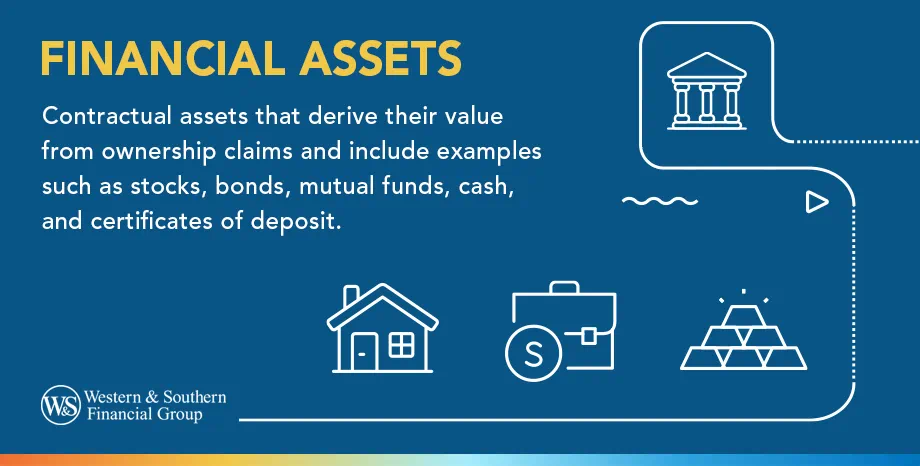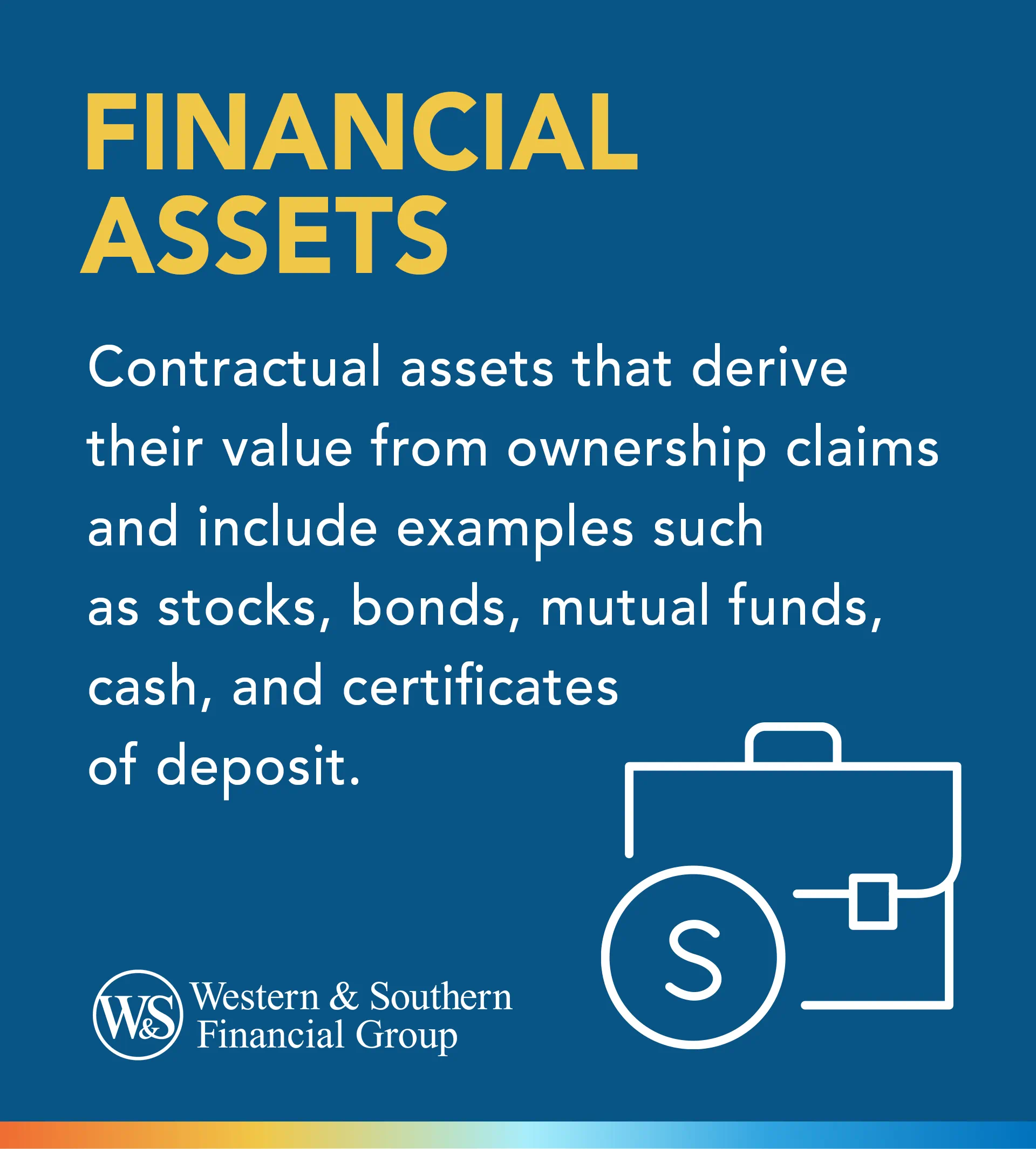Table of Contents
Table of Contents


Key Takeaways
- Financial assets get their value from contractual ownership claims rather than physical properties.
- Common examples of financial assets include stocks, bonds, mutual funds, cash, checking/savings accounts, and certificates of deposit.
- Financial assets can be liquid like cash or non-liquid like retirement accounts that have withdrawal restrictions.
- Diversifying your financial assets can help manage risk compared to putting all assets in one category.
- While financial assets may lose value in down markets, having a mix of assets can provide more stability over the long-term.
Spend any time digging into personal finances, and you're likely to see the terms "assets" and "liabilities" quite a bit. Ultimately, these phrases relate to where your money comes from, the things you own that have value and where your money goes, forming the foundation of your financial health.
One area to focus on and continually grow is your assets. These are the items and property you own, which add financial value to your net worth. Here's what to know.
What Are Assets?
In the most basic sense, assets are things you own that have monetary or financial value. If you want to calculate your net worth for budgeting purposes, then you'll need to have an idea of the kinds of assets you own and their general value.
A basic example of an asset would be your bank account. If you happen to have a vacation home or collect rare baseball cards, those are considered assets, too.
There are three main types of assets: real assets, intangible assets and financial assets. Here's a rundown of each.
Real Assets
Real assets are also known as tangible assets. Consider these the things you can physically touch and hold. These assets have value because of their unique properties. Here are some examples:
- Homes
- Land
- Cars
- Jewelry
- Fine art (or wine, collectibles, etc.)
- Gold or other precious metals
For many people, a home, car and bank account are primary sources of real assets. Other items, such as collectibles, heirlooms and fine art, are assets that can generate value over time, with maintenance and upkeep.
Your checking and savings accounts are examples of liquid assets. These are assets that can easily convert to cash, and that conversion will have minimal impact on their value.
On the other end of the spectrum, you may also have non-liquid assets. These are assets where converting them to cash is complicated or could significantly affect their value. Your home would be one example of a non-liquid asset.
Intangible Assets
These assets are valuable, but there's no physical property or anything to touch. Here are a few examples:
- Patents
- Intellectual property
- Copyrights
- Trademarks
For example, if you're a business owner and have a trademark on a product or service, you have an intangible asset. Even though you can't physically touch intangible assets — as you could your machinery or factory building — they are still valuable and may need protection.
Financial Assets
These types of assets get their value from your contractual right or ownership claim over them. These are some common examples:
- Cash
- Checking or savings accounts
- Stocks
- Mutual funds
- Bonds
- Certificates of deposit (CDs)
These may be familiar to you. Most people will have financial assets in their 401(k) or individual retirement accounts (IRA).
There are types of financial assets that are liquid, such as your checking and savings accounts. But some financial assets are considered non-liquid, such as an IRA — one reason is that you could face penalties for accessing the funds before you hit age 59½.
Another financial asset you may have is your life insurance policy. Depending on the policy you have, if it has a cash value component, it could be considered a financial asset. Confer with a financial representative to learn more. Assets can consist of real (such as land), intangible (such as copyrights, patents) and financial assets (such as stocks, bonds, mutual funds).
Not Everything You Own Is an Asset
As you dig more into what are considered assets, it's key to remember that if you own something, it's not always an asset.
For example, you might have a state-of-the-art home theater system that you spent a few thousand dollars on. While it has probably brought you plenty of enjoyment over the years, the value of your television and speakers decreases over time. Eventually, because of depreciation, these items won't have any monetary value — as opposed to your gold coin collection, which has the potential to increase in value over time.
So, as you go through your budgeting and retirement planning, identify the assets you have that can bring you value over the years and those that will lose their worth.
The Benefits of Diversifying Your Assets
Understanding the difference between a real asset, an intangible asset and a financial asset can help you with your long-term goals and plans. A big reason why it matters is for diversification.
If you have all of your assets in the same category, it may bring additional risk to your portfolio and potentially put your long-term plans in jeopardy. For instance, owning only bonds means you could potentially lose money if there is another financial crisis.
The same is true for your financial assets. A diversified portfolio can help you weather the storm during down times and rough markets. While diversification cannot guarantee a profit or protect against a loss, having a mix of stocks, bonds and cash, including an emergency fund, can help to ensure you are more prepared and have some contingencies in place that can help you handle potentially difficult periods.
The Bottom Line
As you continue developing your future plans and goals, you can work with a financial representative to consider all your options and find the best diversification mix for your needs.
Start investing in assets like stocks and bonds to grow your wealth. Invest In My Future
























